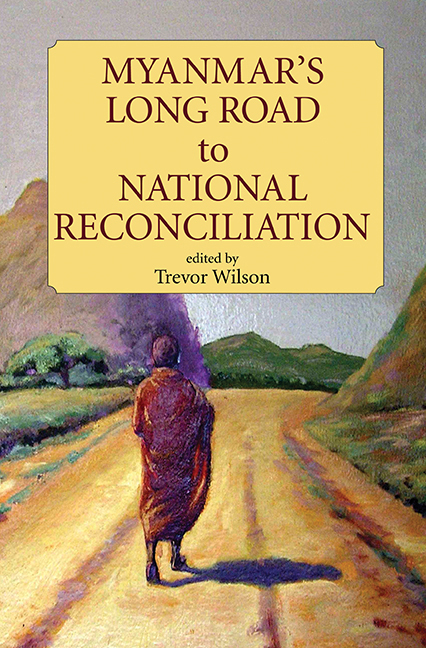Book contents
- Frontmatter
- Contents
- Acknowledgements
- The Contributors
- Glossary
- Overview
- I Perspectives on Recent Political Developments
- 1 “One Day, One Fathom, Bagan Won't Move”: On the Myanmar Road to a Constitution
- 2 Burma's Military: Purges and Coups Prevent Progress Towards Democracy
- 3 Ethnic Participation and National Reconciliation in Myanmar: Challenges in a Transitional Landscape
- II Perspectives on the Economy and on Agricultural Development
- III Perspectives on National Reconciliation and Civil Society Development
- IV Charting the Way Ahead
- Index
3 - Ethnic Participation and National Reconciliation in Myanmar: Challenges in a Transitional Landscape
from I - Perspectives on Recent Political Developments
Published online by Cambridge University Press: 21 October 2015
- Frontmatter
- Contents
- Acknowledgements
- The Contributors
- Glossary
- Overview
- I Perspectives on Recent Political Developments
- 1 “One Day, One Fathom, Bagan Won't Move”: On the Myanmar Road to a Constitution
- 2 Burma's Military: Purges and Coups Prevent Progress Towards Democracy
- 3 Ethnic Participation and National Reconciliation in Myanmar: Challenges in a Transitional Landscape
- II Perspectives on the Economy and on Agricultural Development
- III Perspectives on National Reconciliation and Civil Society Development
- IV Charting the Way Ahead
- Index
Summary
Introduction
Since 1988, Burma/Myanmar has remained deadlocked in its third era of political transition following independence from Great Britain in 1948. Military-dominated rule has continued, there has not been a return to elected government, and there have been no substantive benchmarks of political change. And yet Myanmar in the first decade of the twenty-first century is importantly different from General Ne Win's failed experiment with autarchic socialism in the Burma of 1962–1988. Over the years a series of events have refashioned the socio-political landscape. Defining moments include the introduction of a market-oriented economy following the 1988 assumption of power by the State Law and Order Restoration Council (SLORC, now known as the State Peace and Development Council (SPDC)); the 1990 general election in which the National League for Democracy (NLD) won victory; and Myanmar's membership of the Association of South East Asian Nations (ASEAN) in 1997. Whatever the future holds, in an increasingly globalized world there is little likelihood of Myanmar returning to its hermit-nation status of the Ne Win era.
Myanmar today continues to face a complex diversity of challenges. However, if there is any single issue which is both the key to the political failures of the past and an essential priority for a progressive future, it is the question of national reconciliation and ethnic inclusiveness in the processes of democratic reform. In this respect, the changes in the ethnic landscape have been among the most significant since the SLORC-SPDC assumed power in 1988. Two developments have underpinned such change: first, an ethnic ceasefire movement that was instituted by the military government in 1989 and had spread to over twenty armed opposition groups by the end of the century; and second, the 1990 election in which nineteen ethnic minority parties also won seats, forming the second largest block of pro-democracy parties after the NLD.
At the time of writing, it remains important to stress that there are several ethnic minority areas where conflict has continued, especially in the Thai borderlands.
- Type
- Chapter
- Information
- Myanmar's Long Road to National Reconciliation , pp. 38 - 74Publisher: ISEAS–Yusof Ishak InstitutePrint publication year: 2006



